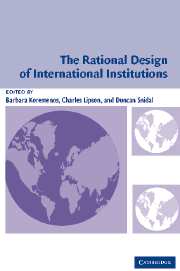Book contents
- Frontmatter
- Contents
- Contributors
- Abstracts
- Title Page
- The Rational Design of International Institutions
- Trust Building, Trust Breaking: The Dilemma of NATO Enlargement
- The Optimal Design of International Trade Institutions: Uncertainty and Escape
- Most-Favored-Nation Clauses and Clustered Negotiations
- Situation Structure and Institutional Design: Reciprocity, Coercion, and Exchange
- Private Justice in a Global Economy: From Litigation to Arbitration
- Multilateralizing Trade and Payments in Postwar Europe
- The Institutional Features of the Prisoners of War Treaties
- Institutions for Flying: How States Built a Market in International Aviation Services
- Driving with the Rearview Mirror: On the Rational Science of Institutional Design
- Rational Design: Looking Back to Move Forward
- References
Most-Favored-Nation Clauses and Clustered Negotiations
Published online by Cambridge University Press: 28 October 2009
- Frontmatter
- Contents
- Contributors
- Abstracts
- Title Page
- The Rational Design of International Institutions
- Trust Building, Trust Breaking: The Dilemma of NATO Enlargement
- The Optimal Design of International Trade Institutions: Uncertainty and Escape
- Most-Favored-Nation Clauses and Clustered Negotiations
- Situation Structure and Institutional Design: Reciprocity, Coercion, and Exchange
- Private Justice in a Global Economy: From Litigation to Arbitration
- Multilateralizing Trade and Payments in Postwar Europe
- The Institutional Features of the Prisoners of War Treaties
- Institutions for Flying: How States Built a Market in International Aviation Services
- Driving with the Rearview Mirror: On the Rational Science of Institutional Design
- Rational Design: Looking Back to Move Forward
- References
Summary
Centralization, which plays a key role in many international regimes, takes two major forms. The first is centralized monitoring and enforcement. An international institution may be responsible for collecting information on compliance or for disseminating compliance information given to it. For example, the secretariat of the World Trade Organization (WTO) collects self-reported information on compliance and oversees the dispute resolution system. Centralized enforcement has attracted substantial attention in the theoretical literature, reflecting concerns about monitoring and enforcing cooperation under anarchy.
The second form is centralized negotiation, where many countries bargain simultaneously within a regime. This has received some attention, largely as one of several features within the norm of multilateralism. Important substantive examples include the General Agreement on Tariffs and Trade (GATT)/WTO, which has clustered negotiations into a few “rounds” with longer periods of no negotiations between them. This centralized bargaining, or “clustering,” is the focus of this article.
Most scholars who study the international trade regime have treated clustering as an unexceptional consequence of GATT/WTO multilateralism. This view neglects the history of the international trade regime. Such clustering is not exclusively a characteristic of the postwar trade regime, since similar clustering occurred, for example, in 1891–93 and 1904–1906. Even in the postwar period, multilateral coordination did not become an important feature of the trading system until the 1960s. This clustering became less important in the 1980s as the major trading nations negotiated bilaterally with one another on market opening, voluntary export restraints, and other issues.
- Type
- Chapter
- Information
- The Rational Design of International Institutions , pp. 99 - 130Publisher: Cambridge University PressPrint publication year: 2003



